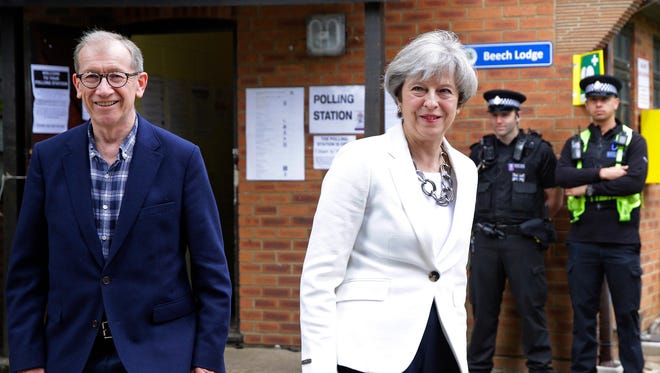British election: 5 big challenges facing Theresa May

British Prime Minister Theresa May's ruling Conservative Party suffered a major setback in Thursday's parliamentary elections by falling short of a majority in the 650-seat House of Commons.
Now that the Conservatives have formed a partnership with Northern Ireland’s Democratic Unionist Party to govern, here are the top five challenges May faces:
Keeping Conservatives, and herself, in control
May could still feel pressure from within her party to resign because of its loss of 12 seats from the last election in 2015.
Entering into a coalition with the DUP makes it harder for her party to pursue its own agenda on Brexit, taxation and spending cuts on welfare policies.
Gearing up for Brexit
May called for the election in April when polls suggested she would win a landslide victory that would give her more leverage to negotiate favorable exit terms with the European Union. A narrow victory hurts her ability to achieve that, as EU leaders have vowed to make Britain pay a steep price for leaving the 28-nation alliance.
EU Council President Donald Tusk said Friday that Britain needs to begin discussions to leave the EU as soon as possible or it risks crashing out of the bloc with no deal on trade, reciprocal working rights for EU nationals and other important issues.
Dealing with President Trump
May has gone to great lengths to avoid confrontations with President Trump, who became a punching bag for Corbyn. His Labour Party made a comeback from earlier projections of a shellacking, a likely sign of U.K. anti-Trump sentiment. That could force May to consider taking a tougher line with Trump in defending NATO, the Paris climate deal and other international alliances he has attacked.
Terrorism
Britain was the target of three terrorist attacks this spring, including one in London less than a week before the vote. Following the latest incident, reports surfaced that May's government was aware of the radical tendencies of at least two of the attackers but did not act. In addition, Corbyn criticized May for eliminating 20,000 police jobs to save money. That adds pressure on May's party to step up anti-terrorism efforts.
Domestic discontent
Corbyn seemed to score his strongest points by attacking the Conservatives for cutting popular social welfare programs. With fewer seats in Parliament, the Conservative Party could be forced to retreat from its austerity policies, including cuts to health benefits.
READ MORE
British election: PM May under pressure 'to go' after disastrous election result